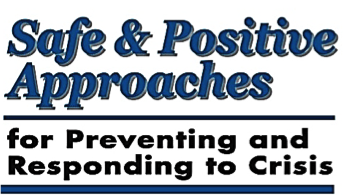Safe and Positive Approaches for Preventing
and Responding to Crisis
|
Part 1 - Staff Effectiveness TrainingStaff Effectiveness Training provides strategies of preventing and defusing crisis situations, methods of intervening using a non‐physical approach, and an examination of staff behavior and its effect on the individuals served. Applying the concepts of positive behavioral interventions and support and trauma‐informed care, the program presents behavioral guidelines for positive interactions, antecedent interventions, de‐escalation techniques, relaxation strategies, and problem-solving skills for crisis prevention. Learning Objectives: A. Participants will be able to identify the behavioral, environmental, and programmatic factors that impact staff effectiveness and promote positive interactions. B. Participants will be able to utilize antecedent strategies and observation skills for the prevention of crisis. C. Participants will be able to demonstrate the use of appropriate and effective de-escalation techniques. D. Participants will be able to demonstrate a 5-step problem-solving process for crisis prevention. E. Participants will be able to describe the effects of stress and demonstrate three relaxation strategies for managing stress. F. Participants will be able to define key terms associated with trauma, identify the prevalence and impact of trauma, and describe ways to put the principles of a trauma‐informed approach into practice. Core Learning Activities:
Supplemental Learning Activities:
|
Program Descriptions |

